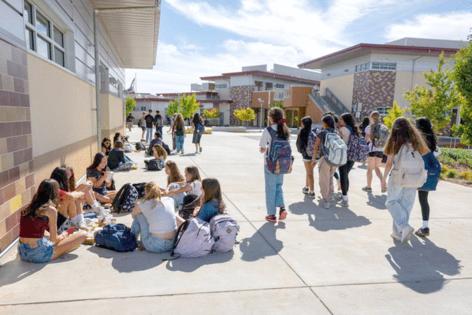Commentary: Are the kids all right? They experience school very differently than we did
Published in Op Eds
I am standing outside the auditorium, seeing my students line up, or attempt to, for graduation photos. In their formal best, they complain their hair isn’t what they wanted or ask when the retakes are. They sneak their phones out to take selfies and ussies, while I am nagged for bobby pins, help with ties and, yes, even, a pocket square.
I snake through the line and walk to my room when I see Ellis, sitting alone in the hall and doomscrolling through their phone.
As I stand in front of them, they hastily put their phone away.
“Sorry, Mr. Kannan.”
“It’s cool. Why aren’t you in the auditorium?”
“I just don’t feel comfortable there. I don’t know if I feel comfortable anywhere.” They couldn’t be more than 4-foot-10. Yet, their words knock me down so much we both sit.
I listen to Ellis talking about feeling awkward at school, being physically and emotionally pushed around. I ask if they share any of this with their parents.
“They just tell me to be myself. That’s the problem.”
I walk Ellis back to my classroom, assuring them they can stay there. I go back downstairs to clear things up so they won’t get in trouble for ditching picture day, all the while wondering how the daily reality my students face is nothing like my schooling or my generation’s. Students’ experiences now are radically different from those of previous generations, but school itself has not changed. Our approaches as educators are similar to a century ago.
When I host students in my room during lunch, the conversations are interesting and loud.
There is a group talking about school stress. One student laments how “it’s a lot of pressure to have every class as an A-plus,” while another wishes “the learning would not be about the letter grade, but other things.” A third chimes in with, “I’m pretty sure most of the adults in my life don’t really know how stressful school is to me. I don’t like being the first to turn in a test or the last. I feel nervous about everything.”
I check in with a student named Rey, who came to our school from Ecuador several months ago. I have found that creating time and space in the day to check in helps because he can speak to me in English or Spanish, giving him more confidence and helping him succeed.
At another table, a student’s anger is white hot because the school administration took her phone that morning in the auditorium. “This place is so draining because of the unnecessary rules; we don’t have a say in any of them,” she says. Another responds: “That’s why I hate this place.”
Ellis. Rey. Lunchtime conversations. Graduation photos. I swim in an ocean of student voices. I ask students to free-write on topics that might help me better understand them.
I give my students a prompt and an index card: “How is school different for you than it was for your parents?”
They write a lot.
Sage says things are so “different now because of technology.” Amari similarly talks about how his parents didn’t have Chromebooks, while Robin bluntly says his parents had only a notebook and a pencil.
Sunny talks about how her parents never had to deal with the level of cyberbullying she endures, when kids “hide behind a screen” typing the worst things. “The feeling of trying to look good” is more dominant in Tommy’s life than his parents’. He cannot be his true self in “many spaces and places.”
“I think school is swim or drown when it comes to social placement,” Morgan bluntly assesses, “Putting on different faces for different people to remain relevant. Saying the wrong thing could ruin almost everything.”
Mollie has “constant fears of violence” her parents would not understand. Her parents never contemplated so many shootings and fights. Each time Brady speaks to his parents about his feelings, they remind him there is nothing wrong in “being himself,” eerily similar to what Ellis told me in the morning. Liv puts a frown on her card and talks about how she takes on fights against prejudice when students say or post discriminating comments; she remarks that her mom would never have to wage those battles.
While reimagining school should be our common goal in the long term, in the short term, I can create a space for all my students, center them in my instruction and support their needs to become strong, confident young people. The world when I was a student was vastly different from theirs; I can try to bridge this gap by prioritizing how they live and experience this thing we call school.
As I get ready to leave my classroom after lunch, Ellis is still there, reading quietly. “I’m listening,” I tell them, and we settle down for another chat.
____
Ashley A. Kannan is an eighth grade U.S. history teacher at Oak Park Elementary School District 97 in suburban Chicago and chair for the district’s social science department.
___
©2025 Chicago Tribune. Visit at chicagotribune.com. Distributed by Tribune Content Agency, LLC.




























































Comments